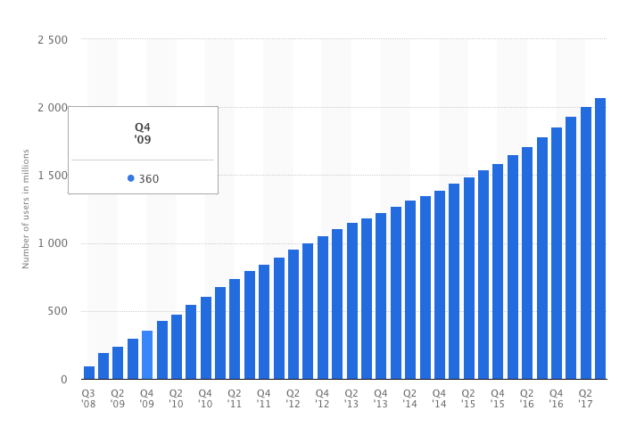In 2008, a man called Oscar Morales used Facebook to rally 12million people to protest against Colombian communist guerrilla Organiation Farc. At the same year, a Facebook group organized a huge water fight in downtown Leeds, England. In September 2008 more than a thousand people spent twenty minutes or so smashing each other with pillows in Grand Rapids, Michigan. It seems that the biggest advantage of Facebook is to gathering people together, and to turn non-social behavior sociable. However, the revolutionary significance of Facebook isn’t here.
Facebook increases the individual’s’ power by allowing people share whatever they want and it sublates the contradiction between capitalism and socialism by realizing social resources shareable. That is the revolutionary significance of Facebook. When ordinary individuals are able to initiate the broadcast themselves, the people’s power increase. According to Michael Hauber’s article “What the net means to me”(1995), people power refers to people individually communicating to present their view on something(Hauber, 1995). In other words, Facebook is giving individuals in societies across the world more power relative to social institutions, and that may well lead to very disruptive changes. Another significance is Facebook changes the cognition of property, from exclusive to public. As marked at Facebook Principle that “Facebook promotes openness and transparency by giving individuals greater power to share and connect.” That is to say, the information and experience on Facebook is shareable so that it ignores the contradiction between capitalism and socialism. Resources on Facebook can be owned by everyone in the public. The basic rule is the more you share the more added value of information and experience.
But there is a question rising, is it a good thing that the more you share the more added value of information there is? On one hand, this rule prospers the start-up company by providing a new marketing way. The platform is so good at “microtargeting” that many small e-commerce companies barely even bother advertising anywhere else (Helm, 2017). If one user share your post, it adds more profitable value on the product because the more people see your advertisement the larger possibility is that people are going to buy it. What’s more, this rule brings a new economy form– “gift economy”. As Simon & Schuster’s book “the facebook effect” (2010) mentioned, Mark Zuckerberg’s facebook is based on a concept named ”gift economy”, which comes from potlatch, a traditional festival in North America area. The basic operating rule is “I’ll contribute something and give it to someone, and then out of obligation or generosity that person will give something back to me.” (p.287) When “gift economy” applies in Facebook community, the situation will be I “like” your post, and the potential rule is you need to “like” me back. And in that case, the interaction within the community will form a virtuous cycle.
On the other hand, it will cause big issue since Facebook has such a large number of users. When Mark Zuckerberg launched his business in 2004 at Harvard campus, none of the funders can imagine it would have 2.07 billion monthly active users in the third quarter of 2017 (Facebook users worldwide, 2017). In 2017, everyone seems to be wondering: Is Facebook taking over the world? Most of us now realize that the social network has become far more than a repository for selfies. When the thing involved with politics, social media platform is not only a place to record and share your life, it becomes political rants of its more than two billion users. What’s more, the advertisement function allows the scope of Russian-backed manipulation on platforms before and after the U.S. presidential election (Seetharaman & Wells, 2017 ). According to Alex Stamos, the Chief Security Officer of Facebook, he announced news that when reviewing the ads buys, Facebook have found approximately $100,000 in ad spending from June of 2015 to May of 2017 — associated with roughly 3,000 ads — that was connected to about 470 inauthentic accounts and Pages in violation of policies. The analysis suggests these accounts and Pages were affiliated with one another and likely operated out of Russia. (Facebook Newsroom, 2017)Isn’t it horrible that someone is manipulating your vote?

Number of monthly active Facebook users worldwide as of 3rd quarter 2017 (in millions)
Another dreadful example is about the “Blue Whale Challenge”.The Blue Whale challenge is said to psychologically provoke players to indulge in daring, self-destructive tasks for 50 days before finally taking the “winning” step of killing themselves. The spread on the platform is so fast that more and more people get involved and died from the event. In this aspect, not all added value is good. If people use it in a negative way, the consequences are terrible.
Security has been a major concern of Facebook’s current users. As the rising of “hacker-geek” culture, people can’t help beginning to fear the information post online. Because whether it is opened or not, the silicon will record everything. It just means we are living a world more transparent and we don’t want to turn our nation into a world of exhibitionists. Fortunately everything is going into a right direction. At least, the CEO of Facebook, Mark Zuckerberg, has already started to fight back by monitoring the fake news. As long as the surveillance becomes more strict, Facebook users can feel more secure about their usage.
By Wenyu Zeng, BU Emerging Media Studies Master’s Student
Reference:
An Update On Information Operations On Facebook | Facebook Newsroom. (2017.). Retrieved November 9, 2017, from https://newsroom.fb.com/news/2017/09/information-operations-update/
Facebook users worldwide. (2017). Retrieved November 2, 2017, from https://www.statista.com/statistics/264810/number-of-monthly-active-facebook-users-worldwide/
Helm, B. (2017, November 2). How Facebook’s Oracular Algorithm Determines the Fates of Start-Ups. The New York Times. Retrieved from https://www.nytimes.com/2017/11/02/magazine/how-facebooks-oracular-algorithm-determines-the-fates-of-start-ups.html
Van Dijck, J. (2013). The Culture of Connectivity: A Critical History of Social. Oxford University Press
Seetharaman, D., & Wells, G. (2017, October 30). Tech Giants Disclose Russian Activity on Eve of Congressional Appearance. Wall Street Journal. Retrieved from https://www.wsj.com/articles/facebook-estimates-126-million-people-saw-russian-backed-content-1509401546